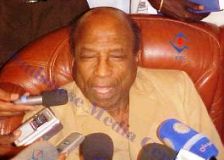Sudan to have new govt by July 9-former rebel
By Opheera McDoom
 KHARTOUM, May 5 (Reuters) – Former Sudanese rebels will join a new government of national unity by July 9 and a new constitution should be finalised in the next four weeks, a senior former rebel official said.
KHARTOUM, May 5 (Reuters) – Former Sudanese rebels will join a new government of national unity by July 9 and a new constitution should be finalised in the next four weeks, a senior former rebel official said.
Sudan’s government and the rebel Sudan People’s Liberation Movement signed a peace deal in January ending more than two decades of civil war in the south. The deal outlines a new system of government under which wealth and power are shared between the north and south.
Mansour Khalid, the political adviser to SPLM leader John Garang, told Reuters in an interview this week that the new government had to keep promises to decentralise power in order keep Sudan as one country. Under the deal the south can vote for secession after an interim period of 6 years.
“If we respect the boundaries between what is a state power and what is a national power, there is no reason for anyone in Sudan to want the country to disintegrate,” Khalid said.
“We are determined — and this is something on which we are not going to budge — that the interim period starts on July 9,” he said on his first visit to the capital in more than 20 years.
Khalid is working on the 60-member constitutional commission which began work this week. It will spend four weeks reviewing a draft already prepared by the government and the SPLM.
The constitution, he said, would fully protect the rights of non-Muslims in the capital Khartoum, which will remain under Islamic sharia law. The south, where most of the population is Christian or animist, will not be subject to sharia.
Khalid said development of the south where there is little infrastructure was crucial, and he called on refugees who had fled the war to return to the south to help.
SANCTIONS
He said U.S. sanctions imposed on Sudan were an obstacle to much-needed investment in Sudan. The United States was due to lift the sanctions after the signing of the southern peace deal, but a two-year-old conflict in Sudan’s western Darfur region has again soured relations between Khartoum and Washington.
The United States calls the violence in Darfur genocide and holds the government and its allied militias responsible.
But Khalid said he thought the United States would likely reconsider and lift sanctions by the end of the year in the interests of making the southern peace deal a success, which could then help end the violence in Darfur.
“I hope that before the end of the year something will give… I’m sure they will review their decision on sanctions,” he said.
Khalid, an intellectual originally from the north, said the government had to deal a U.N. Security Council resolution passed in March which referred alleged war crimes in Darfur to the International Criminal Court.
The government rejected it but has since said it would cooperate to some extent but only in a national court.
“You have to recognise it as a fact. This is a resolution by the Security Council. There is no way for the SPLM or anyone else to say we don’t care,” he said. He said the government had to deal with it immediately.
He said when the SPLM joined the government in July, they would have a positive influence by pushing forward peace talks to find a political solution to Darfur and by expediting national trials for those suspected of war crimes there.
